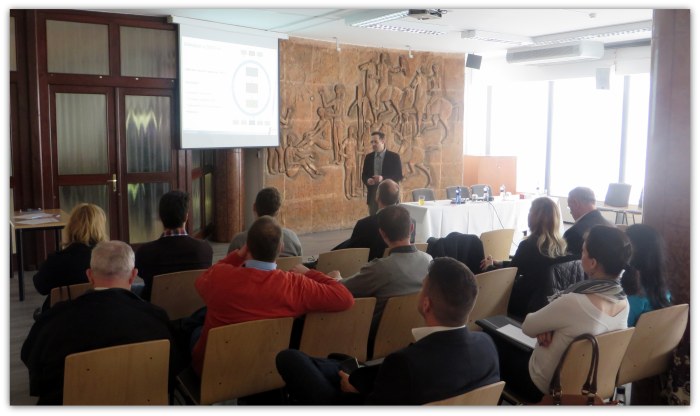The sixth workshop within the Legal Accessibility project was held in Szeged, at the Csongrád County Government Offices (1 Rákóczi square), to which stakeholders active in cross-border cooperation in the Serbian-Hungarian border region were invited. In the form of a round table discussion, two associates of CESCI were collecting information on legal and/or practical obstacles local actors are facing during their activities concerning the other side of the border, as well as good practices useful for bridging these problems.
The meeting was held on the 11th of February 2016 and attended by 13 participants in the following sectors and fields:
- labour and employment policy: Bács-Kiskun County Government Offices’ Head Department for Employment;
- economic development: Hungarian-Serbian Chambers of Commerce and Industry, Csongrád County Chambers for Industry and Commerce;
- academia: Regional Scientific Society of Subotica;
- government sector: Csongrád County Government Offices;
- local government sector: Csongrád County Municipality Offices, Bács-Kiskun County Municipality Offices;
- cross-border cooperation, European grouping for territorial cooperation: DKMT Euroregion, Banat-Triplex Confinium EGTC, CESCI Balkans.

Concerning the Serbian-Hungarian border, crossing difficulties are a fundamental problem. This, due to an insufficient number of crossing points and excessive waiting time, is causing a significant obstacle for day to day relations and also commuting. Border crossing is also hindered by cross-border public transport’s underdevelopment, as well as the poor infrastructure of crossing points. In this regard, migrant crisis has only caused further backwardness to the situation – because of the wire fence, the Szeged-Subotica railway connection is also suspended.
Mutual accreditation of certain documents and official certificates is equally problematic, which does not only hinder cross-border commerce, but also tourism. Relationships between entrepreneurs are limited because potential stakeholders are under-informed, although steps have been made lately to resolve this. Interoperability between employment and education systems is problematic, but has been solved in most cases. Daily commuting, however, is uncommon due to the crossing difficulties mentioned above. Permanent change of residence is more frequent.
As a specific administrative obstacle, it was stated that the expiry date of ATA-cards enabling temporary cross-border transport of goods can be limited by the Serbian side, which makes it more difficult for Hungarian entrepreneurs’ significant or long-term presence on the other side of the border. On the Serbian side, custom regulations are very strict: if a Hungarian project partner publishes free brochures and would like to spread them on the Serbian side, they have to be declared. This also counts for the transport of interpreting booths for one-off events.
In the agricultural border region, only the crossing point at Röszke is fit for transporting crops and livestock. Conditions are only partially suitable at Tompa. However, traffic is still significant at the former, which is why transporting vehicles have to cross in one single truck lane. One solution could be to open another lane or to equip different crossing points with adequate technical and human capacities.
Another mentioned issue was already known from previous workshops, namely hindered medical service access. The picture is further nuanced by the fact that the number of Slovenian citizens that also have a Hungarian nationality is big. Having a double nationality, many commute to Hungary for employment or educational purposes, but they often do not dispose of a health insurance on this side of the border. A similar problem is that Serbian driving licences are not recognised in Hungary, which makes it more difficult for otherwise Hungarian citizens to find employment in some fields of work.
Just like along the Slovak border, the issue of baccalaureate accreditation in the case of young Hungarians living on the other side of the border. However, looked at it from the other side, studies followed in Serbian count for an advanced language exam in the Hungarian higher education admission system, which is a disadvantage for students in Hungary.
Attendees drew attention to the issue deriving from family names: if somebody acquires documents in Hungary, their names are written the Hungarian way, which has already caused problems in their birth country in the past, in the case of inheritance.